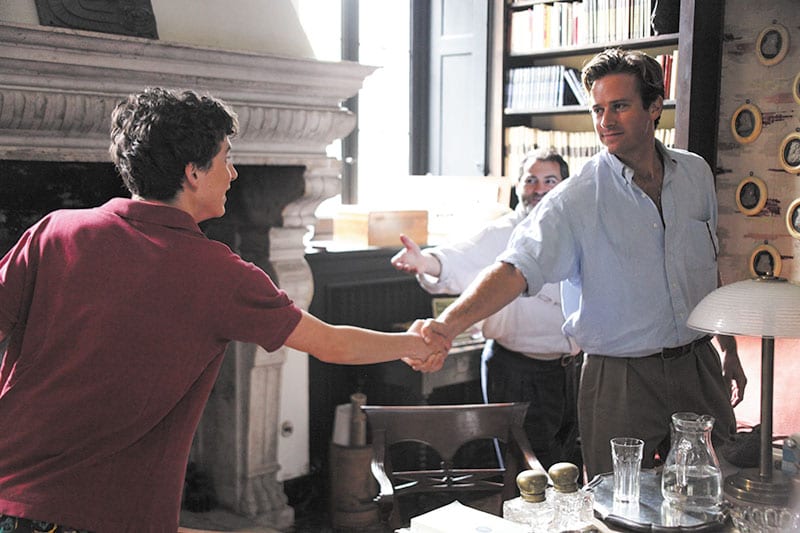A handshake leads to something more in ‘Call Me By Your Name.’
Reviews of three new film releases: ‘Call Me By Your Name,’ ‘Downsizing,’ ‘Molly’s Game’
ARNOLD WAYNE JONES | Executive Editor
jones@dallasvoice.com
Call Me By Your Name. In a remote village in Northern Italy in the summer of 1983, an archaeology professor (Michael Stuhlbarg) hosts a grad student, Oliver (Armie Hammer), in his home for a six-week externship. He’s done this every year, though this time his 17-year-old son Elio (Timothée Chalamet) shows a particular interest in the strapping student. But is their interaction that of rivals or a hidden flirtation?
Director Luca Guadagnino specializes in sexual curiosity expressed in moody pieces (I Am Love, A Bigger Splash), but the delicate dance he conjures in Call Me By Your Name — adapted by the legendary queer film director James Ivory — is something totally unexpected. The plot is fairly linear: A month in the country and the restlessness that leads to longing and forbidden love; it’s downright Chekhovian. But the woozy, tactile sensuality elevates it to high art. The ancient kouros statuary of muscled athletes preserved for centuries; the conflict of being the outsider (Jewish, gay) while fitting in; the tension between attraction, pleasure and desire … all of these elements, so subtly handled, form a kind of European Brokeback Mountain. More is said with silences, camera angles and the lush score by Sufjan Stevens — as well as the interaction between Chalamet and Hammer — than is said in dialogue (although one monologue by Stuhlbarg will steal your breath away). Like The Unbearable Lightness of Being, Call Me By Your Name stakes its ground at the intersection of intellect and instinct, of passion and judgment. It’s pure cinemagic. (Now playing)

Hong Chau (with Matt Damon) gives one of 2017’s best performances in ‘Downsizing.’
Downsizing. Alexander Payne has staked out a claim as the snarky poet of Nebraska; most of his films are set at least partially there, his home state; he uses the cliches of Midwesternism as both a shorthand and a mirror on which he reflects his ironic take on peculiar characters. Payne usually keeps the objects of his barbs close to reality, or at least recognizability, but he takes his first venture into sci-fi with Downsizing, even if only tangentially. The premise is that technology now allows human beings to be shrunk to the size of caterpillars — an advance intended to save the world from global warming and extend the value of money, turning the middle-class into relative millionaires, living in communities of Barbie Dream Homes on pennies.
Paul Safranek (Matt Damon) and his wife (Kristin Wiig) decide to take the leap, but a complication ensues, and Paul finds himself broke and alone, irreversibly minimized, a sad-sack in middle age, starting all over. He meets a flamboyant upstairs neighbor (Christoph Waltz) who convinces him he’s missing out, but also a Vietnamese refugee (Hong Chau), unwillingly minimized by her dictatorial government, who thinks finding a true purpose is more important than hedonistic pleasures.
The point of the film — and Payne usually keeps his points near the surface — is that we can’t minimize our problems by minimizing ourselves, that, in a pure Buddhist sense, life is suffering and suffering is desire and we might as well make the most of it.
The visual effects employed by making full-sized human look small hasn’t advanced substantially since the days of The Incredible Shrinking Man (possibly that’s intentional), but the sci-fi is merely a gimmick for commenting on society, the survival of humanity and starting over. It’s not entirely successful — the irony sometimes wears on you — but Downsizing contains one of the not-to-be-missed performances of the year. Hong Chau, as the abrasive, defiant, pushy woman who transforms Paul’s life, delivers such an exquisitely nuanced and powerful performance that she makes you gasp. Never has someone so annoying been so beautifully rendered. She buoys the film just when it seems to run out of steam and pushes it past the finish line. (Now playing)
Molly’s Game. It’s said that stage is an actor’s medium, film is a director’s and TV a writer’s. That’s probably why Aaron Sorkin has long been a big name … in television. While he’s met some success in film (A Few Good Men, Steve Jobs, an Oscar for writing The Social Network), his unmistakable style — rat-a-tat dialogue from smug, over-educated urbanites, walking-and-talking their way through politics and sex with his kind of issue of the week approach — are ideally suited for episodic TV. He’s never ventured into directing, turning over his scripts to others to realize, until now, Molly’s Game is his directorial debut, and he starts at the top: A feature starring Jessica Chastain, Kevin Costner and Idris Elba set for a Christmas release. But rather than vanity boondoggle, the film is the perfect expression of his aesthetic — dizzyingly fast, smart and unexpected.
Chastain plays Molly Bloom, a real-life ski champ who suffers a debilitating injury and changes gears from world-class athlete to administrative assistant. Only her casual office job includes running an underground poker game, populated by some big names in Hollywood, business, politics. She keeps it all legal, eventually branching out on her own and upping the game to an exclusive blue-chip experience until she screws up, gets involved with the wrong people and becomes the target of an FBI investigation.
Although partly a crime procedural and partly a courtroom drama, Molly’s Game is, at essence, an Aaron Sorkin study in character told with great panache. Chastain is well-suited for the lickety-split, hair-trigger dialogue and smart-ass intelligence. Elba has a more cooling influence (is there anyone cooler?) that pairs well. And the supporting cast is peppered with fine work of lowlifes, playas and assholes. It might not be the first way you’d think to spend the holidays, but it snaps like great jazz. (Dec. 25).
Also opening this week: All the Money in the World; I, Tonya; Father Figures; Jumanji Welcome to the Jungle; Pitch Perfect 3.
Coming soon: The Post (Jan. 5); Hostiles (Jan. 5); The Phantom Thread (Jan. 12).
















